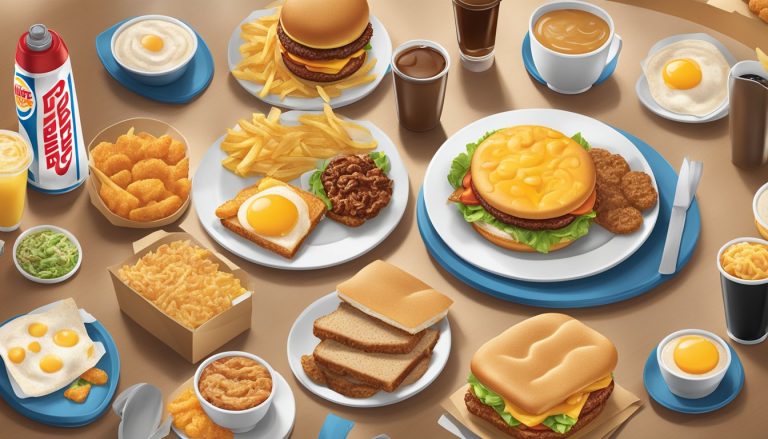Fast food breakfast options often get a bad rap for being unhealthy, but some choices can be surprisingly nutritious. Burger King’s breakfast menu offers several items that provide a balance of essential nutrients while keeping calories and unhealthy ingredients in check. These breakfast options can be a convenient and relatively healthy way to start your day, especially when you’re on the go.
For those looking to make smarter choices at the drive-thru, Burger King has some breakfast items worth considering. By selecting wisely, customers can enjoy a tasty morning meal without completely derailing their health goals. The key is knowing which menu items offer the best nutritional value.
1) Egg-Normous Burrito
The Egg-Normous Burrito from Burger King offers a substantial breakfast option for those seeking a hearty morning meal. This menu item contains a blend of ingredients wrapped in a large tortilla.
The burrito packs 910-930 calories, providing a significant portion of daily caloric needs for many adults. It derives about 54% of its calories from fat, making it a relatively high-fat option.
Protein content is notable in the Egg-Normous Burrito, accounting for approximately 15% of its macronutrient composition. This can contribute to feelings of fullness and satisfaction.
The burrito contains several allergens, including egg, gluten, milk, soy, and wheat. Individuals with food sensitivities should be aware of these components.
While not the lightest breakfast choice, the Egg-Normous Burrito can fit into some diets when balanced with other daily food choices. Its size and nutrient density make it suitable for those needing a filling start to their day.
2) Sausage Biscuit

The Burger King Sausage Biscuit offers a satisfying breakfast option for those seeking a balance of flavors. This menu item contains 420 calories, providing a moderate energy boost to start the day.
The biscuit includes 27 grams of fat and 32 grams of carbohydrates. While the fat content is substantial, it contributes to the feeling of fullness that can help curb mid-morning snacking.
Protein content in the Sausage Biscuit helps support muscle maintenance and repair. The combination of sausage and biscuit provides a mix of both animal and plant-based proteins.
For those watching their sodium intake, it’s important to note that this item likely contains a significant amount of salt. Pairing it with a low-sodium side or beverage can help balance the overall meal.
The Sausage Biscuit can be part of a nutritious breakfast when consumed in moderation. It’s best enjoyed alongside fresh fruits or vegetables to add essential vitamins and fiber to the meal.
3) Maple Oatmeal

Maple oatmeal stands out as a surprisingly nutritious option on Burger King’s breakfast menu. This hearty dish combines wholesome oats with the natural sweetness of maple syrup.
Oatmeal provides a good source of fiber, which aids in digestion and helps maintain feelings of fullness. The addition of maple syrup offers a touch of sweetness without relying on refined sugars.
This breakfast item also contains essential nutrients like iron and B vitamins. These nutrients support energy production and overall health, making it a smart choice for starting the day.
Burger King’s maple oatmeal typically includes dried fruit, adding extra flavor and additional nutrients. The fruit contributes natural sugars and vitamins to the dish.
For those seeking a balanced breakfast, maple oatmeal offers a mix of complex carbohydrates and moderate protein. This combination can help stabilize blood sugar levels and provide sustained energy throughout the morning.
4) Cheesy Tots

Cheesy Tots are a popular side dish at Burger King, offering a crispy exterior with a warm, cheesy center. These bite-sized treats provide a satisfying texture and flavor combination that many customers enjoy.
A serving of Cheesy Tots contains approximately 310-316 calories, depending on the source. This calorie count falls within a moderate range for a side dish, making it a potential option for those watching their calorie intake.
The macronutrient breakdown of Cheesy Tots is roughly balanced, with about 44% of calories coming from carbohydrates and 44% from fat. Protein contributes the remaining 12% of calories, providing a small boost to the nutritional profile.
One serving of Cheesy Tots contains about 17 grams of fat, including 2 grams of saturated fat. The sodium content is notable, with approximately 195 milligrams per piece.
For those with dietary restrictions, it’s important to note that Cheesy Tots contain wheat as an allergen. This information is crucial for individuals with gluten sensitivities or celiac disease.
5) Garden Side Salad

Burger King’s Garden Side Salad offers a nutritious breakfast option for health-conscious diners. This light dish provides a fresh alternative to traditional morning fare.
The salad consists of crisp lettuce, ripe tomatoes, and crunchy carrots. These vegetables deliver essential vitamins and minerals to start the day right.
With only 60 calories per serving, the Garden Side Salad is a low-calorie choice. It contains just 4 grams of fat and 3 grams of carbohydrates, making it suitable for various dietary needs.
The salad provides 2 grams of fiber, promoting digestive health and helping to maintain satiety. It also offers 4 grams of protein, contributing to muscle maintenance and repair.
For those watching their sodium intake, the Garden Side Salad is a smart pick. It contains minimal salt compared to many other fast food breakfast items.
Customers can enhance the salad’s nutritional value by adding grilled chicken for extra protein. Choosing a light dressing or skipping it altogether keeps the calorie count low.
Nutritional Overview of BK Breakfast Options

Burger King offers a range of breakfast options with varying nutritional profiles. Some menu items provide a balance of essential nutrients while others are higher in calories and less nutritious components.
Understanding Nutritional Labels
Nutritional labels on BK breakfast items display key information like calories, fat, protein, carbohydrates, and sodium content. A typical Croissan’wich contains 300-500 calories, 15-30g of fat, 10-20g of protein, and 25-35g of carbohydrates. Hash browns add 250-500 calories and 15-30g of fat, depending on size.
Sodium levels in breakfast sandwiches often range from 600-1000mg. Sugar content varies, with sweetened items like French toast sticks containing 10-15g per serving. Understanding these values helps customers make informed choices based on their dietary needs and goals.
The Role of Balanced Breakfasts
A balanced breakfast provides energy and essential nutrients to start the day. Protein sources like eggs and sausage in BK sandwiches help with satiety and muscle maintenance. Whole grain options, when available, offer fiber and complex carbohydrates for sustained energy.
Fruits or vegetables are limited on the BK breakfast menu, so customers may need to supplement elsewhere for vitamins and minerals. Portion control is key, as combo meals can easily exceed 1000 calories. Customizing orders, such as removing cheese or choosing smaller sizes, can improve the nutritional balance of a BK breakfast.
Incorporating BK Breakfast Into a Healthy Diet

Enjoying Burger King breakfast as part of a balanced diet requires mindful choices and smart strategies. Pairing menu items with fresh ingredients and practicing portion control can help optimize nutrition.
Pairing with Fresh Ingredients
Add fresh fruit to your BK breakfast order. An apple or banana provides fiber and nutrients to complement your meal. Consider bringing your own side salad with mixed greens and vegetables for added vitamins and minerals.
Pack Greek yogurt to boost protein intake alongside a smaller breakfast sandwich. This combination helps increase satiety and provides probiotics for gut health.
Opt for unsweetened beverages like water, black coffee, or tea instead of sugary drinks. These hydrating options have zero calories and won’t spike blood sugar levels.
Portion Control Tips
Choose smaller breakfast items or split larger ones to manage calorie intake. A kids’ meal can be a good option for adults looking to reduce portion sizes.
Remove one half of the bun from breakfast sandwiches to lower carb consumption. This simple step can significantly reduce overall calories.
Ask for sauces and dressings on the side. This allows you to control the amount used, potentially cutting down on added fats and sugars.
Limit high-calorie sides like hash browns. If ordering, share with a friend or save half for later to keep portions in check.




